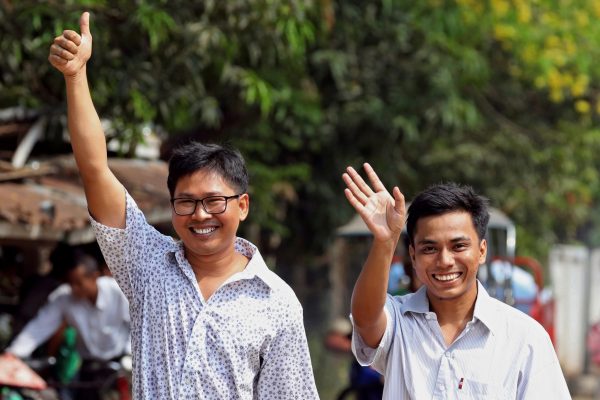A Reuters report released on 26 May 2019 gained far less attention. The report detailed the treatment of seven soldiers accused of killing 10 Rohingya Muslim men in September 2017 in the same case the journalists were investigating when arrested. This situation illuminates the current level of impunity granted to the military in Myanmar, the dangers this poses for free expression, and the need to remain wary of overly celebratory global media moments that can obscure more nuanced realities on the ground.
The seven soldiers were the only officials held accountable for the widespread violence against Rohingya Muslims in the village of Inn Din in Rakhine, Myanmar. They were dismissed from the military and sentenced in April 2018 to 10 years of hard labour. Many interpreted this as an indication that the military and the National League for Democracy (NLD) government under State Counsellor Aung San Suu Kyi were taking accountability seriously. Aung San Suu Kyi called the sentencing of these soldiers ‘the first step on the road of taking responsibility’. Nevertheless, the soldiers were quietly released in November 2018.
The release of journalists Wa Lone and Kyaw Soe Oo’s through presidential pardon is problematic. They should not have been arrested and charged for doing their job. Just before their arrest in December 2017, the two had obtained photographs of the 10 Rohingya men — bound but alive — and of the shallow grave containing their gruesomely hacked bodies. The journalists were invited to meet with police officers who handed over documents, which the journalists were promptly arrested for carrying. The entrapment was corroborated by a police officer who testified that he had been ordered to set up the journalists for arrest.
The international response to their arrest was immediate given the journalists’ affiliation with Reuters, the importance of the story and the obvious fabrication of charges. The case gained additional attention in March 2018 when prominent human rights lawyer Amal Clooney joined the journalists’ defence team.
In February 2018 Reuters published ‘Massacre in Myanmar’ — the investigative report Wa Lone and Kyaw Soe Oo had been working on when arrested — and the final story in the series ‘Myanmar Burning’, which won a 2019 Pulitzer Prize. ‘Massacre in Myanmar’ features the first interviews with Buddhist villagers admitting to torching Rohingya homes and killing and burying Muslims. Soldiers and paramilitary forces also confirm the military’s key role in the violence.
The journalists’ court case exemplifies the lack of judicial independence in Myanmar. In February 2018, the two were denied bail. On the same day, a police witness in their case admitted that the information in the documents for which the journalists were arrested had already been published in newspaper reports. In July, a judge charged them under the colonial-era Official Secrets Act, and in September they were sentenced to seven years in prison.
A Yangon high court rejected their appeal in January 2019, and in April, the Myanmar Supreme Court rejected their final appeal without elaboration. Their release in May 2019 came after all legal appeals were exhausted and the tradition of thousands of presidential pardons in celebration of the New Year provided an opportunity that would not provoke or directly challenge the military.
Most Myanmar journalists do not have a high-profile international media outlet and a celebrity lawyer to lobby for them. At least 47 journalists have been prosecuted under the NLD government and several were called in for questioning within days of Wa Lone and Kyaw Soe Oo’s release. A journalist for the privately-owned Channel Mandalay news station was arrested on 15 May 2019 while covering a land rights protest against a coal-fired cement factory, accused of involvement in the protest and detained without charge.
The editor-in-chief of the privately-owned Rakhine state news agency Development Media Group went into hiding in May 2019 after authorities filed a complaint against him for unspecified violations of the Unlawful Associations Act. In April 2019, the military filed an online criminal defamation charge under Section 66(d) of the Telecommunications Law against the Myanmar language editor of The Irrawaddy over reports of clashes in Rakhine state. These cases and others involving rural or regional outlets get very little attention, promoting self-censorship among journalists unwilling to cover corruption for fear of repercussions.
That the NLD government’s answer to this dilemma was to remain silent on the military’s actions and wait for the opportunity offered by presidential pardons indicates that they are not likely to stand up to the military to protect press freedoms in the future. The continued impunity enjoyed by military forces, the use of repressive laws and a court system unwilling or unable to act independently significantly dampen hopes for increased freedom of expression in Myanmar, despite the celebratory accounts.
Lisa Brooten is an Associate Professor of Radio, Television and Digital Media at Southern Illinois University and editor of the recent volume ‘Myanmar Media in Transition: Legacies, Challenges and Change’.

